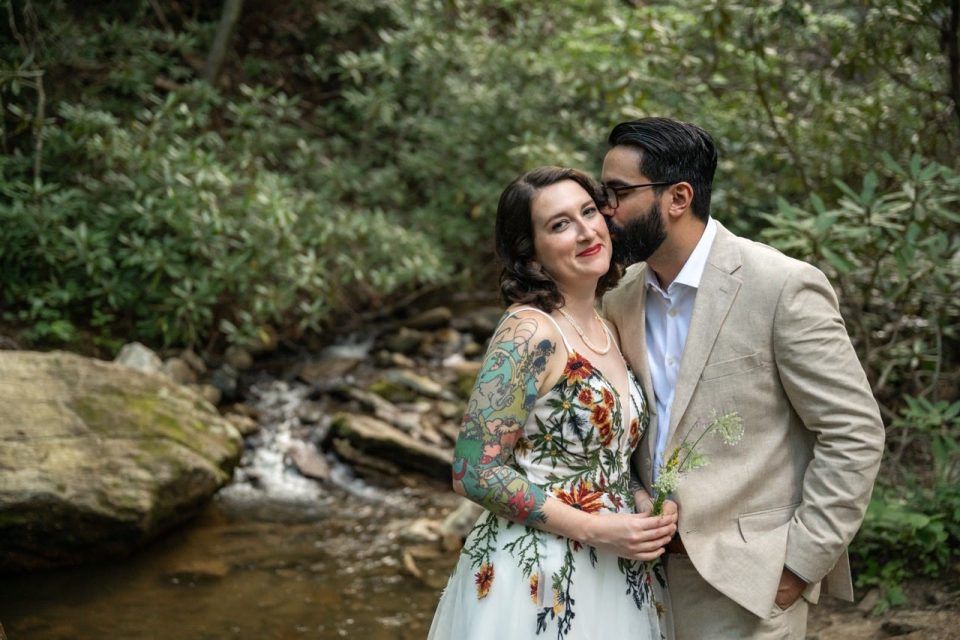Wedding Budget Breakdown: 15 Top Tips | Simply Eloped
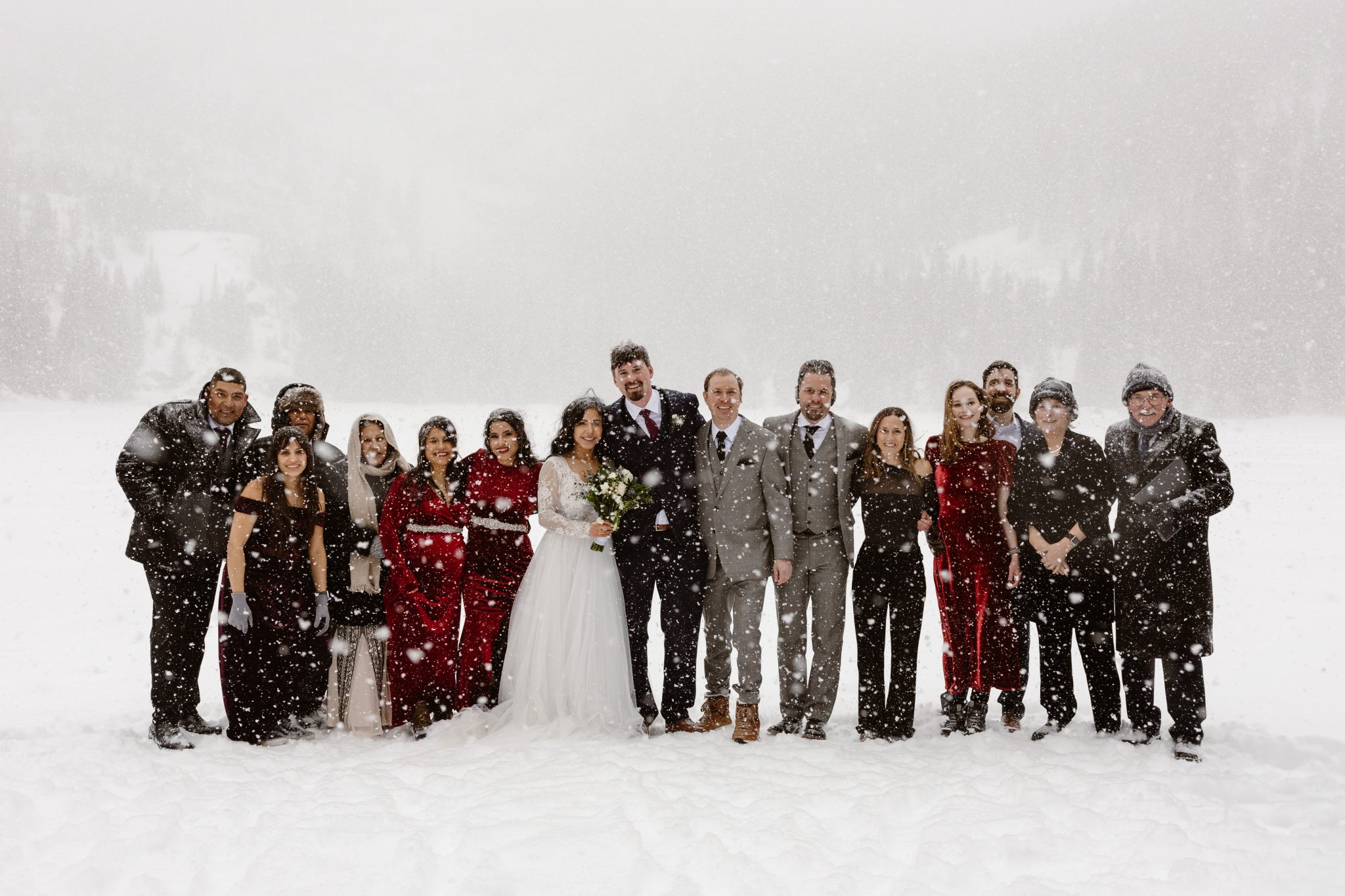
As you step into the realm of wedding planning, one of the first and most crucial steps is crafting a budget that aligns with your dreams. A well-structured wedding budget ensures that your celebration is not only beautiful but also financially sound. In this comprehensive guide, we will walk you through the intricacies of wedding budgeting, offering practical tips and strategies to help you create a successful financial plan for your special day.
This may be news to you, but according to The Knot Worldwide, the average wedding cost is $33,000 which averages out to a cost per guest of $284. We understand how that number can feel scary and daunting! Especially with inflation and economic or job uncertainty, resources can be scarce these days. Read below for our top considerations for getting you and your partner in a healthy place to assess your future wedding budget and support you during the wedding planning process.
It Helps to Be Realistic
Let’s be frank with each other: if the average cost per guest in the US for a wedding is $284 and you have 50 guests, it’s not realistic to expect to spend $5,000 on your big day (the math shakes out to $14,200, btw). Cost increases depending on the time of year, too. Entering wedding planning with unrealistic expectations is only going to set you and your partner up for shock, disappointment, and defeat and that’s no way to kick off planning the best day of your life!
Educating yourselves about true costs (and anticipating some unexpected ones) will ensure that you can properly set and follow a budget. While having open conversations initially about budgeting, you may choose a tracker tool or excel sheet to ensure you’re recording these numbers as they come about.
Following a guide like this will ensure you’re asking the proper questions up front to better prepare you for the actuality of a budget that’s in line with what you envision for your big day.

Working with Your Partner is Crucial
When it comes to money and weddings, dollar bills can grow wings and fly away more easily than one would anticipate. The last thing you want to do is enter your marriage with a miscommunication about how much your wedding would cost and how much each of you were willing to spend! It’s extremely important to work in collaboration with your partner to ensure this is one topic you’re both on the same page about.
No one wants any financial surprises on day one of marriage! Setting aside time to communicate with your partner. What do you want to spend on your wedding? What are your expectations for the number of guests? Do you want a live band or a DJ? Discussing these factors, and continuing that conversation along the way of wedding planning will halt surprises and open the door for opportunities to collaborate when challenges or big scary questions arise. Just trust us here – keep your partner in the loop and they will be appreciative of it!
Funding Source
No two weddings are the same which means no two wedding budgets are the same. Identifying your price range, and understanding how you intend to pay for your wedding should come pretty shortly after your engagement, especially since you two may have very different ideas of budget and wedding visions. Here are a few contemporary ways couples pay for their wedding:
- Tapping savings – Many couples save for big events like a wedding and it can be a great way to use your savings fund. We encourage you to collaborate early on regarding how much you each already have saved, how much you’re willing to contribute, and how much you’ll need to save over the course of the year to achieve your wedding goals.
- Aid from Parents/Family – It’s quite common for parents to have a savings account allotted for contributing to their child’s wedding, though not all parents. Post engagement, you may ask each set of parents if they had intended or budgeted to contribute to your wedding and how much, if any, that amount would be.
Word of caution: if you do intend to accept the generous gift of a parent or set of parents to help with the wedding, they may have specific ideas as to what you do with that money, who you invite, or where you hold the wedding. We encourage open and transparent communication to get all of those expectations out in front so there’s no frustration later down the road. Also, they will definitely expect to be invited to the wedding so if you’re planning an intimate elopement, don’t bet on funds from any family members. - Wedding Loan – We have definitely seen an uprising in couples taking out loans specifically to pay for weddings! While this is such a great option to ensure that you are indeed able to cover for costs for your big day, please be careful with this option as you may be paying for your wedding 10-years into your marriage, and that’s not fun for anyone to start out a marriage in extreme wedding debt.
- Crowdfunding or Crowdsourcing – This is a very rarely used tactic to pay for a wedding. We generally see couples using crowdfunding or crowdsourcing to raise funds for their honeymoon, in lieu of everyone bringing a gift to the wedding.
There may be other ways to source money to cover the costs for your weddings, but these are the most commonly used tactics or methods.
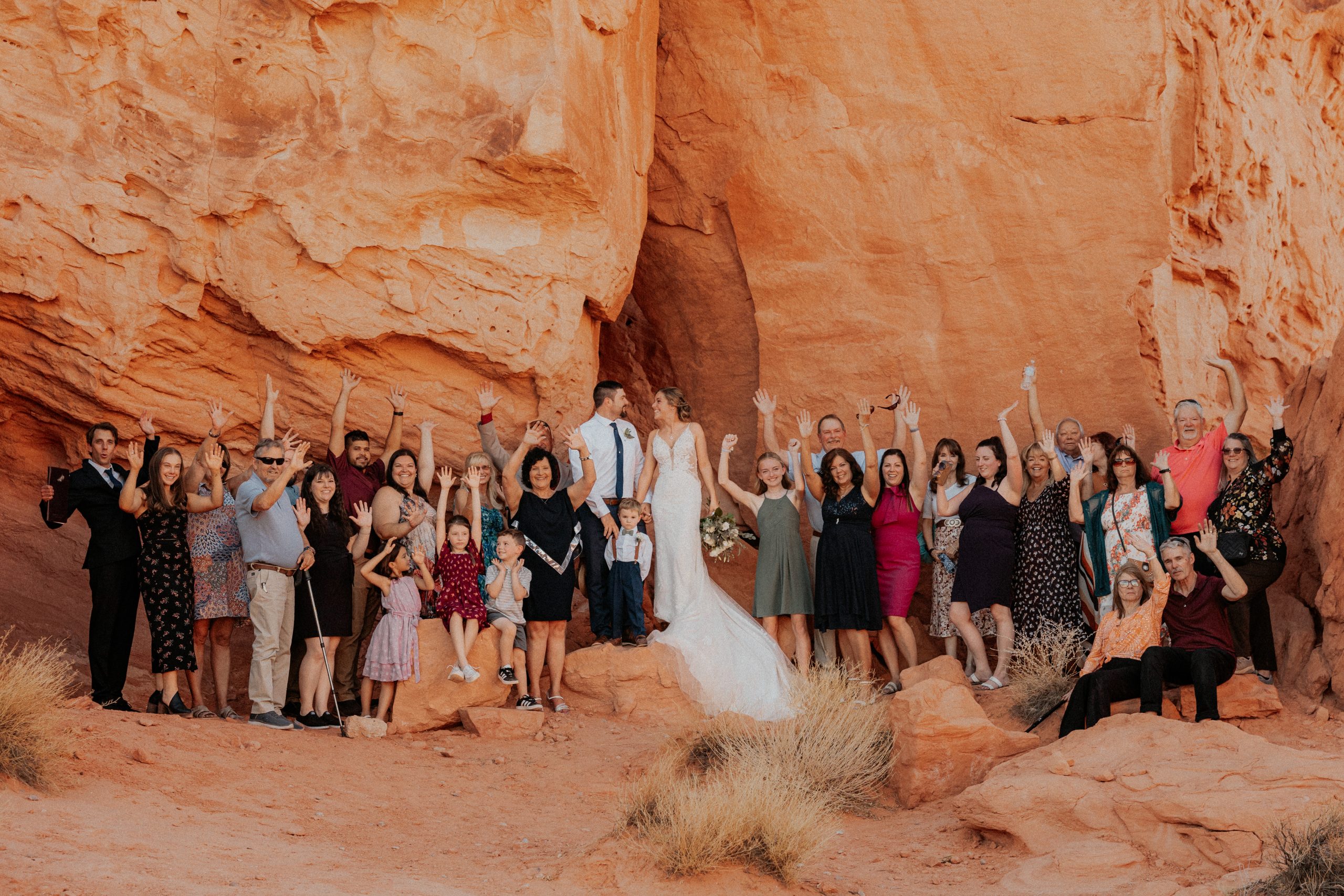
Identify your Wedding Vibe
It may not be intuitive to have your budget conversation intertwine with you and your partners’ wedding vision. However, it’s an important one to lock in with your partner while assessing your destination and priorities PRIOR to making big choices like venue or guest count.
What do we mean by vibe? When you are dreaming about your perfect wedding, what stands out to you? Is it on a beach? Is there a smaller group? Is there a dance floor? Maybe a photo booth? No two weddings are the same and your celebration should match the vibe of YOUR relationship! So, whether you’re going with a Lord of Rings theme or you’re wanting your dog to be your officiant, the vibe you’re after for your wedding will definitely help you narrow down some of the big decisions like where to host your wedding or what types of equipment / decor you’ll need to pull off your vision.
This is a great moment to get creative and figure out what’s important to you and your honey for your wedding. Don’t feel locked in to making it a serious event. If your relationship is fun and dynamic, find unique and special ways to highlight that in your wedding vibe prior to embarking upon planning.

Start with Destination
Okay, so now you’ve determined where the budget is coming from, aligned with your partner on the general budget and overall vision, so what’s the next key decision to make? WHERE you’re going to host your dream wedding! The general cost of your wedding is dictated by the size of the guest list AND the destination you choose to hold your wedding. For instance, the average cost of a wedding in New York state is above $40,000 but in Nevada or Idaho is under $20,000, so where you chose to hold your wedding will have a significant impact on the cost.
Here are some important contemplations when assessing which destination to get married:
- No place like home – Are you thinking of getting married where you live or in your hometown? This will impact who is able to attend your wedding. Sometimes travel can be prohibitive for individuals low on funds or who have disabilities. For instance, if you’re wanting grandma to attend your wedding but she can’t roadtrip or snag a plane, that may determine that you’ll need to host the wedding near where grandma lives.
- Going International – If you are considering an international wedding, like Mexico, while it may save you on costs like a wedding venue and wedding vendors, it may be prohibitive as to who is able to attend your wedding, as not everyone can afford or has the ability to travel internationally.
- A Whole Shabang – You may be surprised to hear it, but the activities you do before and after your wedding can be just as memorable as the wedding itself! We see a lot of couples combine their wedding and honeymoon in one trip – like to Hawaii or Italy – so if you’re considering somewhere amazing, you may as well ensure the activities you do around your wedding day are equally exciting. This can definitely impact where you end up choosing to hold your wedding ceremony.
- Planning Lead Time – An important thing to keep in mind is how far out you’re hoping to hold your ceremony. The average engagement is 15 months long, which gives ample time to plan a wedding, but if you’re looking to have a shorter window of planning just be aware fewer venues may be available or accessible to you for your desired date.
- Vibe Check – Back to that vibe question. If you’re wanting a beach wedding you’ll need, well…a beach! There’s also a big difference between a lakeside beach vs an oceanside beach. Determining the vibe you see in your head can definitely determine which destination you choose, so keep this in consideration.

Determine Guest Count THEN Venue Shop
I hope by now it’s abundantly clear that there are two primary factors that influence your wedding budget: the destination / wedding venue you choose and the number of guests. As stated previously, the average cost per guest in the US is $284 so that can be a great barometer to understand the average cost of how much you should expect to spend based on your guest size. At Simply Eloped, we define an elopement as 20 or less guests, a microwedding as 20-50 guests, a small wedding anything 50-100 guests, and a large wedding anything 100 or above.
One practice I always encourage couples to do together is to make your wedding dream guest list independent of one another. Split up your list in MUST haves (parents, best friends, close family members, etc), like to haves (friends, co-workers, etc) and then okay having or not having. This helps your partner understand your priorities in terms of guest list. Then bring your lists together and see what your total dream count is, your total dream count minus having/have not and then further subtracting like to have and see where each gets you in terms of a final count.
It’s possible and likely not everyone you invite to your wedding will be able to make it. According to The Knot, 20% of the guests you invite will be unable to attend, so that’s a great estimate to take into consideration. Once you narrow down the list of your invites, you’ll be in a good place to establish what size of venue you’ll be seeking in the destination you have deemed to hold your wedding.
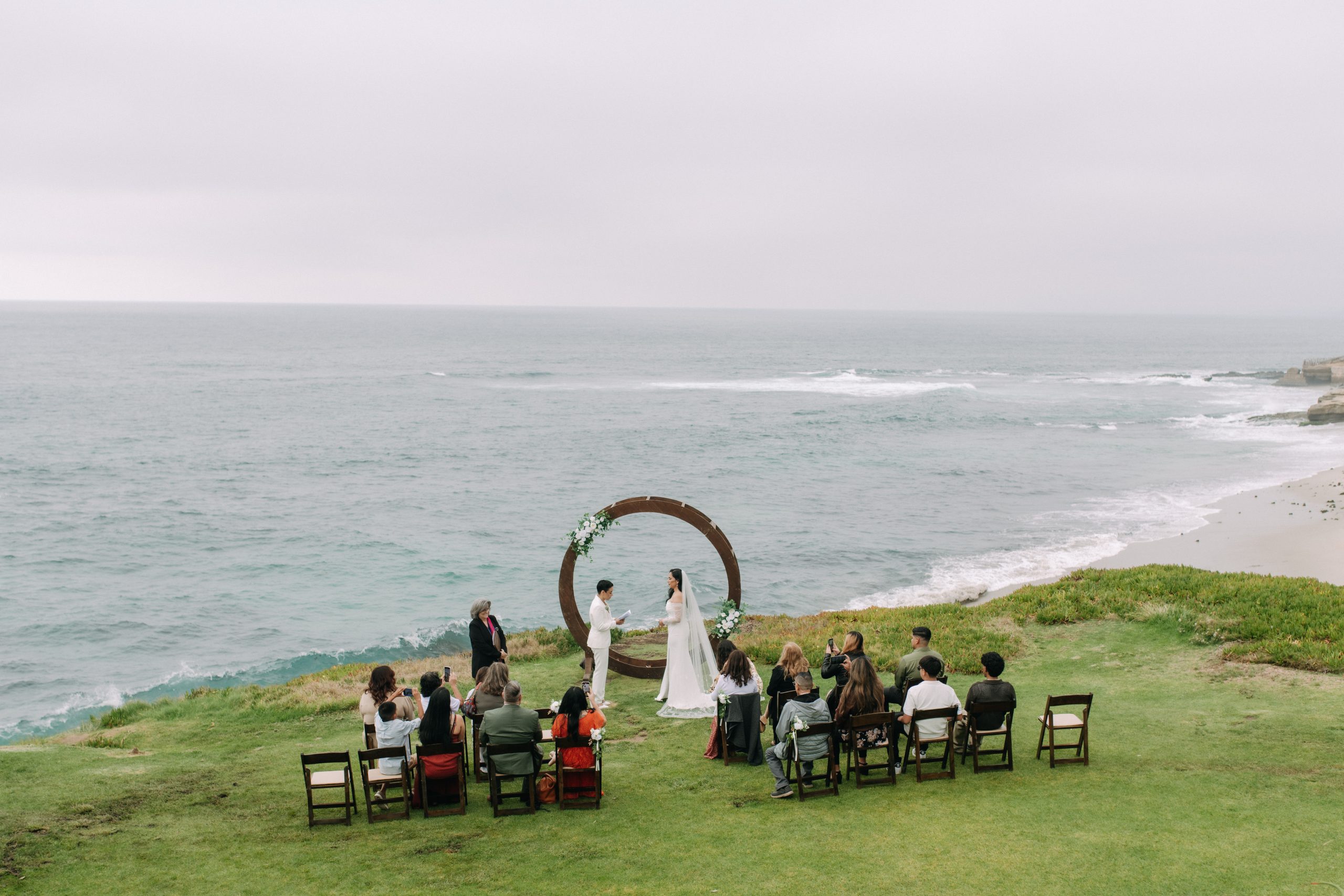
Be Clear About What’s Included for Your Wedding Venue
Now that you’ve locked in your destination and general guest count, you’re in a great place to begin shopping venues – how exciting!!! Here are a handful of questions to keep in mind while you’re browsing:
- What is the venue capacity for guest size?
- Does the venue allow for both ceremony AND reception in the same place or same general area?
- What kinds of equipment are included in the reservation such as chairs, sound system, dance floor, etc?
- Does the venue prefer you use their catering, their preferred vendor list or are you permitted to bring in outside food?
- Does the venue provide a bar / wine / liquor license or is that up to the caterer / bar service?
- Is there ample parking and bathrooms available for a group of your size?
- Does the venue provide any decor like archways, tables, linens, etc?
There are many more questions when considering a venue but this is a solid start to commence shopping.
Brace yourself – venue rental will likely be the largest expense within your budget and there are wild pricing variations based on what kind of venue you end up selecting. Barns to meadows, ritzy hotels to enchanting vineyards, there’s no shortage of venues to meet your budget needs or your guest size restrictions. If saving money on a venue is your top priority, we’ve found the most affordable options are backyards that can accommodate your group size, national, city or state parks and even campgrounds!

Prioritize Where You Splurge and Where You Save
If you’re on a tight budget, there may be the need to prioritize what aspects of your wedding are most important to you. It’s possible you and your honey are huge foodies and refuse to negotiate on having exceptional food at your wedding for your guests. Or perhaps there’s a high-end DJ or band you have your eye on to make way for a stellar dance party post-ceremony. Wherever your “must-have” for vendor type lands, you may determine to allocate a higher percentage of resources towards hiring your eye-in-the-sky vendor or venue, in exchange for another aspect of your wedding.
For instance, we regularly hear from couples that they feel passionately about having the best quality photographer they can afford. That expense can be a huge cost – anywhere from $10,000 and beyond! Therefore, you may consider using silk or wood florals instead of real as a cost-saving method. Working with your partner to determine what’s a non-negotiatable and what’s something both of you don’t feel as passionately about can definitely help guide the way towards areas you’re able to save money for your big day.

Always Beware of the “Cheapest” Option
We see this happen frequently: a couple wants to save money and is willing to hire the “cheapest” option for a vendor-type like officiant or DJ and then are really disappointed when they experience the final product of what that entails. Not all vendors are equal in quality and often a higher priced vendor means they have years of experience, exceptional reviews and thus higher demand. A lower price can mean many things but we find it often indicates a green or new vendor or what we call a “churn and burn” vendor who books themselves as tightly as often, resulting in less personalization and less care.
Keep in mind this is supposed to be the best day of your life and the last thing you want to feel when it’s all said and done is that you should’ve just spent a few extra hundred dollars for better quality! Each vendor can really make or break your big day, and sometimes the worth for the savings isn’t worth it.
Be Mindful of Periphery Costs
Something we see that often creeps up on our couples are the periphery or not-so-obvious costs when it comes to creating a wedding budget. Examples of this in regards to a venue may be having to pay extra for the use of a venue or caterers liquor or beer and wine licenses. Sometimes photographers charge extra to access a digital gallery for your photos. You also need to keep in consideration flights, hotels and meals if you’re traveling to a destination you don’t live for your wedding. A lot of weddings also cover a rehearsal dinner or a brunch the day after the wedding ceremony and reception. When you boil it down, there are numerous small expenses that can really increase the overall budget for your wedding event. Here are other examples of periphery costs that may not be totally obvious at the outset of planning your big day:
- Taxes for your venue and vendors
- Tips for your vendors
- Postage + materials for wedding invites and thank you’s
- Wedding dress or tux alteration costs
- Set up / take down fees for your venue or caterer
- Gifts for the wedding party
- Inclination of weather preparation such as fans or heaters
- Hair & nail costs pre wedding day
- Misc decor like cake stand / cutting materials, table numbers, signage, etc
- Unexpected service charge
- Transportation
It may be wise to have a line item in your budget that is slated for “unexpected wedding expenses” and allocate 10-15% in your budget just for this.

Don’t Be Afraid to DIY
We get it: even the term “do it yourself” can feel daunting, scary and overwhelming. Who has the time these days to create hand-made signs or write calligraphy table tags? That’s why we’re extending the term to “do it yourselves”. It’s very possible your artistically inclined maid-of-honor or crafty mother-in-law would be delighted to help with aspects of your wedding. One of my personal favorite memories from my best friend’s wedding was sitting on her kitchen floor the night before her big day, assembling centerpieces with store-bought florals.
Even though taking on tasks like floral arrangements or venue decorating can feel like a lot, you may be surprised how many people in your life may be honored to help you tackle aspects of your wedding to alleviate your budgetary restrictions. Our only warning here is to not overwhelm yourself with too many projects right before your wedding, as that can lead to extreme stress and burnout right before your big day. It’s best to sparse out as much as you can as early as you can. It’s also so important to have owners of certain projects, people you trust can take something from beginning to end without supervision or management.
Hiring Friends or Family
Speaking of asking friends or family to help out, what’s more special than having someone you love take on a big portion of your wedding needs? For instance, if you have a friend or family member you’d love to be your officiant, this may help you save money and will make for a much more personalized / fun wedding ceremony! If you proceed in this direction, please note you may need to investigate state laws to ensure it’s an easy process to become registered as an officiant in the state where you’re getting married (for instance, it’s very difficult in Hawaii to become registered as an officiant, but very easy in Idaho; each state has different laws and guidelines).
You may also have someone in the family that is a stellar cook or even a professional chef! While that can be a fun way to save money, you will need to approach them to understand their kitchen and equipment needs, their schedule and what they would or wouldn’t charge for. Don’t forget to check with your venue about whether or not they allow outside food or caterers!
It’s possible you have a friend or family member that is a great photographer or videographer, but this is one area we don’t generally recommend you hire someone you know. For starters, they won’t be able to enjoy your wedding at all because they’ll be busy capturing every darling moment of your wedding day. Also, if the portraits or video don’t turn out the way you had hoped, you don’t get a “do-over” on those assets. This may be one area that is too high-risk to employ someone you know and love.
Overall, there are a lot of creative ways to fold your friends and family into your big day to cut down on budgetary costs and ensure you still get the wedding of your dreams.
Plan for the Worst in Advance
Trust us when we say this: you need either a wedding planning or day-of coordinator to be on-site the day of your wedding. The last thing you need on your wedding day is dealing with vendors when someone is running late, or confused about where to load in / out or getting Uncle Jerry water when he’s feeling a heat stroke coming on. Your biggest priority on your wedding day should be relaxing, getting gorgeous or handsome for your honey and trusting that it will all happen the way it’s supposed to.
Word to the wise – no matter how much planning you do, no matter how much preparation you put in, something will go awry. Be it adverse weather, family drama, or your cake decorator misspelling your honey’s name, it’s highly likely something is not 100% perfect. Having an on-site coordinator or wedding planner present on the day of your wedding allows you to point your recently manicured fingers in their direction, advising anyone who comes to you with any issue to take it up with them. They’re your biggest protector and your best source of help the day-of. This is one of the wedding items we highly recommend you don’t skimp on.
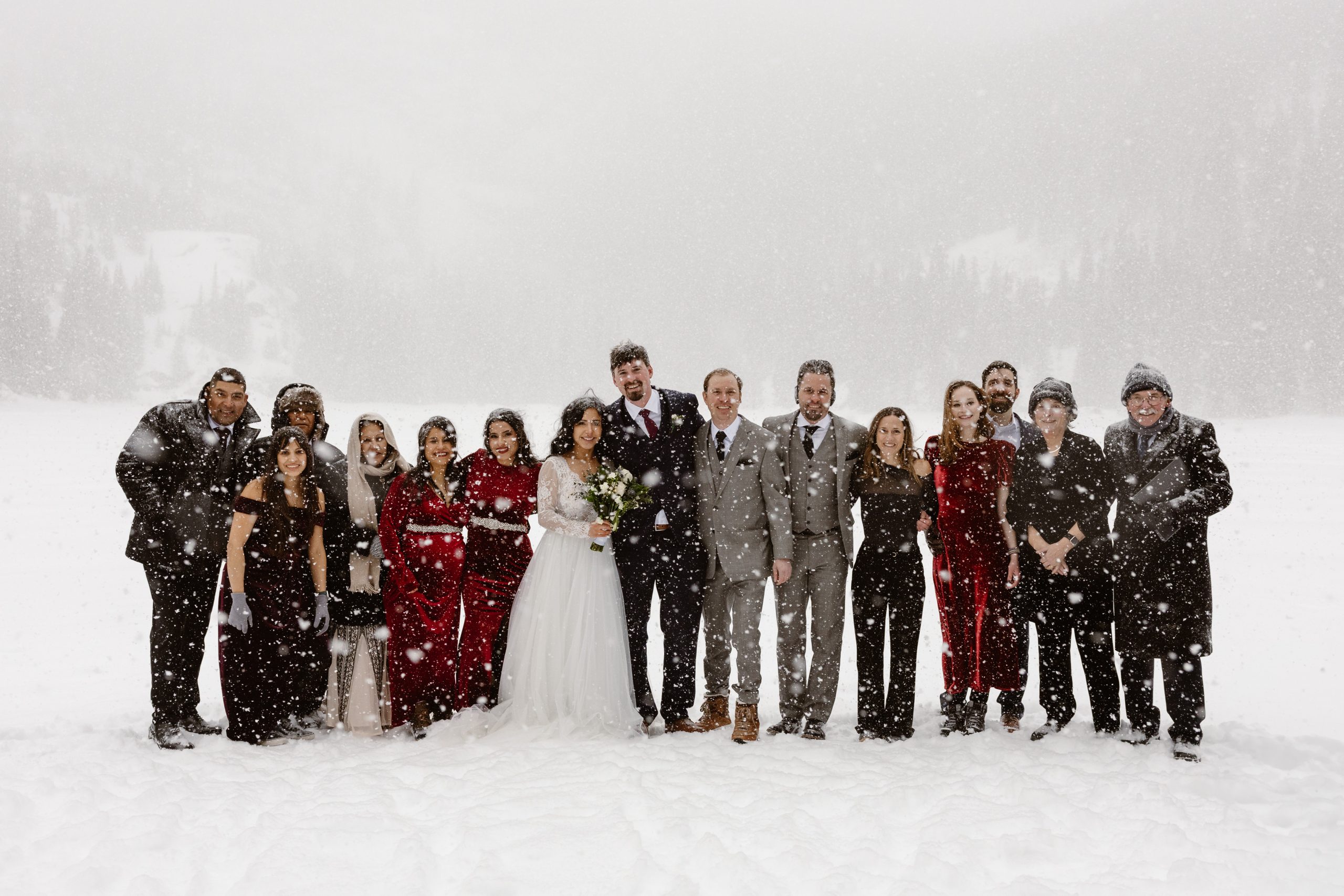
When You Don’t Keep Track, You Lose Track
Regardless of what size of wedding you choose and which destination you choose to hold it in, managing a wedding budget can be a complicated task. Juggling quotes, add-ons, taxes, tips, guest count and more can overwhelm the best of us! If you haven’t hired a wedding planner to oversee your whole budget, it falls on you as the responsible party.
Google Sheets, we know, is the go-to favorite but unless you’re an excel whiz, even this can befuddle your average newbee. The Knot has great budgetary planner tools or even just a general budget planner tool like Nerdwallet.
No matter how you choose to track, the most important tip we have for you is that you do track, otherwise it’s likely you come out on the other end married and severely in debt, and we don’t want that for you!
Also, shameless plug, the average cost of eloping is $2,500 vs the national average for a large wedding of $33,000 so if you’re truly on a budget, just let us coordinate your wedding for you. You get your marriage license, and we do the rest. Easy, peasy.

North Star: “What do WE want”?
Look, talking about money with your honey can be stressful and uncomfortable. Getting engaged and planning a wedding can bring about all sorts of feelings from your friends and family. Getting married is a big milestone and not something to be taken lightly! But here’s a healthy reminder: you’re engaged to be married because you’re in love with your partner!!! This is a day that should be about your love, what makes your relationship special and a celebration of the two of you coming together in your newly minted marriage.
We highly encourage you and your partner to be firm about what it is that you want. If performing a wedding in front of hundreds of people gives you extreme anxiety or feels irresponsible because you can’t afford it, then make a different choice. Making a different choice may require you to set boundaries with family members in ways you’ve never been challenged with or face tough conversations with those you love, but that also may be a really healthy way to enter your marriage with your partner.
In summation, do what you want, boo. Your wedding is for you, and don’t let anyone else tell you otherwise. We hope these fifteen tips on how to approach your wedding budget were helpful!
Sources:
- Brides. Wedding Cost Checklist: Here’s How to Allocate Your Entire Wedding Budget. www.brides.com/story/wedding-budget-guide-allocating-funds-staying-on-track
- The Knot. What Your Wedding Budget Should Look Like, according to Data. www.theknot.com/content/wedding-budget-ways-to-save-money
- The Wall Street Journal. How to Create a Wedding Budget You Can Actually Stick To. www.wsj.com/buyside/personal-finance/how-to-plan-a-wedding-budget-01658343967

